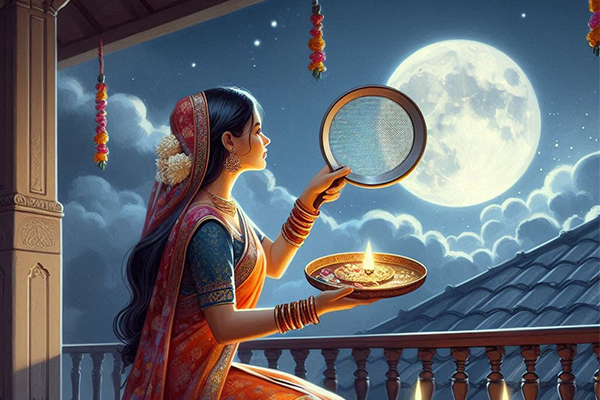
Karwa Chauth is a one-day festival when married women fast from sunrise to moonrise without food or water for the safety and longevity of their husband’s live and for everlasting prosperity in the family. North Indian states like Rajasthan, Uttar Pradesh, Himachal Pradesh, Haryana, and Punjab have the celebration with much fanfare and at a grand scale. The festival is celebrated on the fourth day after the full moon, in the Hindu luni-solar calendar month of Kartik (November-December).
Karwa Chauth Time, Tithi & Muhurat
Karwa Chauth on Thursday, October 29, 2026
Karwa Chauth Puja Muhurat - 06:57 PM to 08:09 PM
Duration - 01 Hour 12 Mins
Karwa Chauth Upavasa Time - 06:56 AM to 10:02 PM
Duration - 15 Hours 05 Mins
Moonrise on Karwa Chauth Day - 10:02 PM
Chaturthi Tithi Begins - 03:36 AM on Oct 29, 2026
Chaturthi Tithi Ends - 12:39 AM on Oct 30, 2026
What Is Karwa Chauth (Meaning)?
.jpg)
The term Karwa refers to an earthen pot used in the rituals, while Chauth means the fourth, as the festival falls on the fourth day after the full moon in the month of Kartik (according to the Hindu calendar). During Karwa Chauth married women undertake strict fasting of Karwa Chauth and observe certain rituals. Women break their fast only after seeing and making the offerings to the Moon. The fasting of Karwa Chauth involves intake of no food or water after sunrise till the sighting of the Moon in the night. Bhagwan Shiva and his family including Maa Parvati, Shri Ganesha and Kartikeya are worshipped and revered. The festival of Karwa Chauth also coincides with Sankashti Chaturthi which is another significant festival where fasting is observed to revere Shri Ganesha.
Why is Karwa Chauth Celebrated?
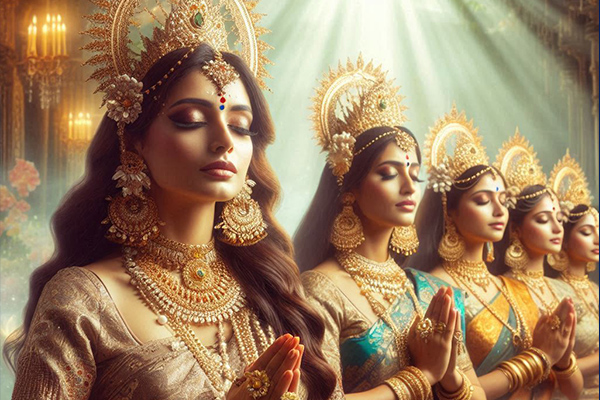
The festival of Karwa Chauth first started in the North and Western part of India. There are different stories and legends about the origins of the festival.
As per legends once Gods were defeated by the Demons who asked Brahma for help and protection. Brahma stated that to defeat the demons the consorts of Gods will have to fast for the wellbeing of their husbands. All Goddesses fasted on the Chaturthi of Kartik month and Gods were able to defeat the demons and since then the festival of Karwa Chauth is celebrated.
Another legend is that once in Mahabharata when Arjuna went away to do strict penance to please the Gods and be blessed with Divine weapons. Draupadi got worried and asked Shri Krishna what she could do to help her husband. Shri Krishna advised Draupadi to observe the Karwa Chauth Vrat for the wellbeing of Arjuna.
Also, in North India soldiers would often leave their wives and children, and their wives would often pray for their safe return and longer life. Interestingly, the festival also concurs with the beginning of the Rabi crop cycle. Large earthen pots are used to store wheat grains. These pots are called Karwas. Thus, it is believed that the fast may have started as a prayer for a good harvest in the regions where wheat grains amply grew.
Karwa Chauth also intensifies the bond of Young Married Girls who may feel homesick at their husband's home. Performing Karwa Chauth rituals together strengthens the bonds of all Women
Karwa Chauth Vrat Katha
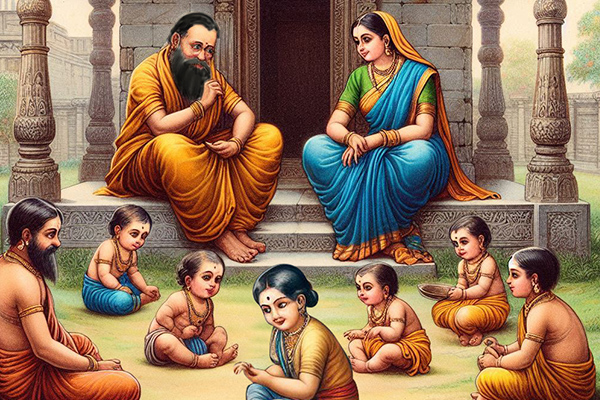
Once upon a time, Ved Sharma, a Brahmin from the city of Indraprasthapur, was blissfully married to Leelavati, with whom he had seven wonderful boys, and one talented daughter called Veeravati. She was spoiled by her parents and siblings since she was the only sister of seven brothers.
She was married to a decent Brahmin guy when she matured. Veeravati observed Karwa Chauth fast for the long life of her husband with her sisters-in-laws after marriage, while she was with her parents. Veeravati couldn't stand the hunger during the Karwa Chauth fast. She collapsed and fell on the ground due to her weakness.
All the brothers could not endure their beautiful sister's plight. They knew Veeravati, a Pativrata, would refuse to eat anything until she could see the moon, even if it meant risking her life. All the brothers came up with a scheme to deceive the sister into breaking her fast. One of the brothers climbed Vat's far tree with a sieve and a light. When Veeravati regained consciousness, the rest of the brothers informed her that the moon had risen and took her up to the rooftop to see it.
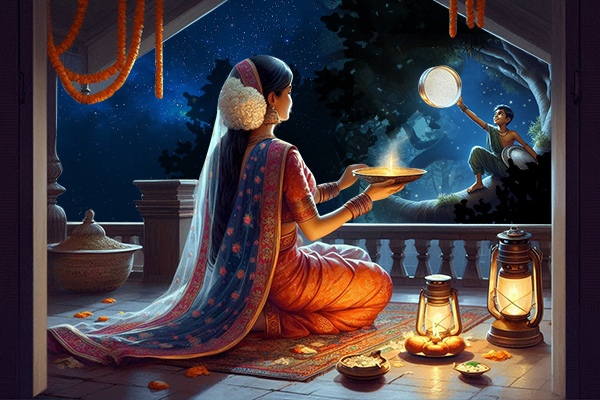
Veeravati saw the light behind the sieve on a far Vat tree and assumed the moon had risen behind the tangle of trees. She quickly offered offerings to the light and broke the fast to satisfy her hunger.
When Veeravati began eating, she received a slew of terrible omens. She discovered hair in the first mouthful, sneezed in the second bite, and received a letter from her in-laws on the third bite. When she arrived at her husband's house for the first time, she discovered her husband's corpse.

When Veeravati saw her husband's lifeless body, she burst into tears and chastised herself for making a mistake during the Karwa Chauth fast. She began to weep uncontrollably. Goddess Indrani , the wife of God Indra, came to comfort Veeravati after hearing her lament.
Veeravati questioned Indrani about her destiny on Karwa Chauth and begged her to bring her husband back to life. When Goddess Indrani saw Veeravati's sorrow, she informed her that she broke the fast without making an Argha (sacrifice) to the moon, and as a result, her husband died prematurely. Indrani urged Veeravati to follow Chauth or 4th Day fasting on each month of the year, including Karwa Chauth, and promised her that her husband would return alive.
Veeravati then followed monthly fasting with full faith and all rites. Veeravati eventually regained custody of her husband because of the Punya accumulated through her fasting.
Karwa Chauth Traditional Puja Rituals
Following are the traditional rituals for Karwa Chauth Katha on Karwa Chauth date and Karwa Chauth Vidhi. Karwa Chauth Vrat Katha is observed on this long-day.
Karwa Chauth Samagri (Items)
- Karva Chauth Image/Photograph/Stickers from local markets.
- Sindoor (Vermillion Powder), Dhoop Batti, Agarbatti
- Paan or Betel Leaves
- Decorated Karva (Mud pot with an outlet to the side)
- Red Chandan
- Mouli/Janeu (Sacred Thread)
- Mitti Diya
- Ghee/Oil
- Rangoli
- Kapoor/Camphor Balls
- Small Garland of Flowers (1-2 garlands),
- Circular Sieve
- Cotton Wicks
- Clean Drinking Water
- Raw Rice Grains
- Supari/Areca Nut/Betel Nut.
- Henna Mehndi Cones
- Alta/Red Dye for Hands & Feet
- Nail Polish & Other Cosmetic Items
- Hair Clips
- Indian Anklet (Payal)
- Fruit Juice
- Sweets
- Fruits
- Puri, Kachori and Halwa Meal
Karwa Chauth Puja Ritual at Home
Start preparing for the Karwa Chauth festivities in advance.
If you have made plans to celebrate it, buy make-up and cosmetics (shringar), jewelry and Karwa lamps and plates. Remember that the local shops and bazaars have exclusive products, so you have plenty of options.
Get up before sunrise on the day of Karwa Chauth. Have something to eat and drink.
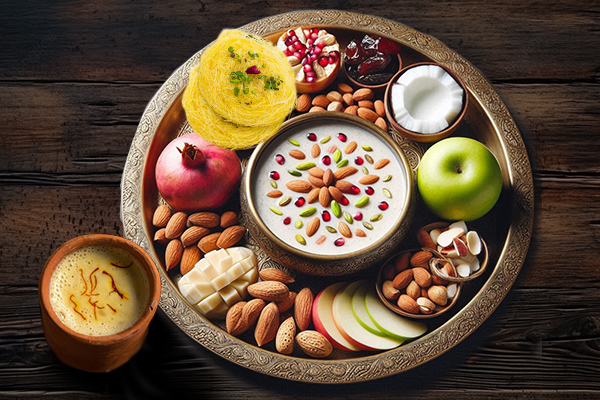
Women in Uttar Pradesh eat Soot Feni (a type of sweet vermicelli) a night before the day of celebration with milk in sugar. It is said to help the women abstain from water the next day. Women in Punjab have the Sargi in Punjab that serves as pre sunrise meal.
On the day of Karwa Chauth, spend time with the other women in your community.
Apply Henna on each other’s hands and feet.
It is better if you get your husband (or fiancé) involved. Husbands offer gifts and treats in exchange for the tough fasting and prayers of their wives.
At Around 4 pm in the afternoon, have a small square area (40 cm x 40 cm should be sufficient) next to a vertical wall inside or outside your house. Ensure you clean the area with water. In the middle of the area create a Swastik mark with Turmeric.
Place the Karwa Chauth Calendar (i.e. image of Karwa Chauth) against the vertical wall.
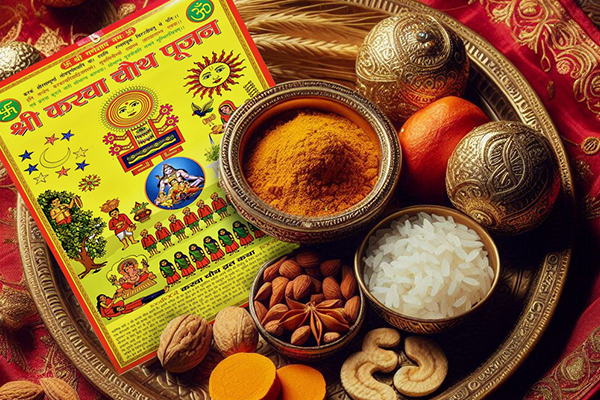
The Karwa Chauth Calendar has images of Maa Parvati, Bhagwan Shiva , Kartikeya and Shri Ganesha and represents the Karwa Chauth Katha/Story. Just before the image, place a small bowl with raw rice grains.
Have roli, mouli (sacred thread), Haldi powder (turmeric powder), a glass of clean water or a glass of milk, a clean betel leaf and a betel nut in a plate.
Kindly place the karwa in the center of the Swastik mark that you created and fill it with water or milk. Make sure you put cotton on the side of the Karwa to stop liquid spill.
Close the top of the Karwa with its cover and over the cover place grains of wheat and sugar.
Now apply the Roli to the Karwa and then tie the mouli (sacred thread) around its neck. If you are performing this ritual alone, prepare another Karwa repeating the above steps. Keep this second Karwa next to the image of Karwa Chauth. This Karwa is said to belong to Goddess Parvati.
Dip the Mango leaves into the glass of water/milk and use it to sprinkle some of the liquid onto the image of Karwa Chauth.
Now apply Roli to the images of Gods on the Karwa Chauth calendar. Then mix a small amount of turmeric and raw rice grains and sprinkle it on the image with your fingers.
Place the betel leaf before the image and on the top of it, place the betel nut.
Now exchange your Karwa with the Karwa of Goddess Parvati. This exchange must be done seven times so that you are holding Maa Parvati’s Karwa in your hands.
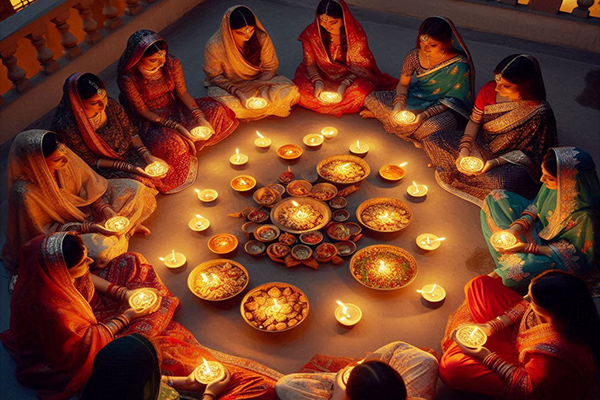
While exchanging Karwas recite the following words: ‘Kindly take my Karwa, oh married woman whose husband will live forever. Please take my karwa, oh sister of seven brothers. Please take my karwa, oh mother of seven children!’
Pray to the image of Karwa Chauth: ‘I pray to you with whatever understanding I have of rituals. Please forgive me in case I make any mistakes.’
Next is to do a recitation of the story of Karwa Chauth, also known as ‘Karwa Chauth Katha’. These stories can be read in any language of your choice. Keep in mind that while reading or listening to the story, you should hold some raw rice grains in your fists. When each story is completed, loosen your fist and place the rice grains into the pallu of your saree. Then take another fistful of rice as the next story is recited.
After the katha recitation, donate the Karwas to a nearby temple. Also, the rice grains used during the ritual should be donated to the temple. Then touch the feet of all elders in the family to seek their blessings.
Main Ceremony: Evening Hours
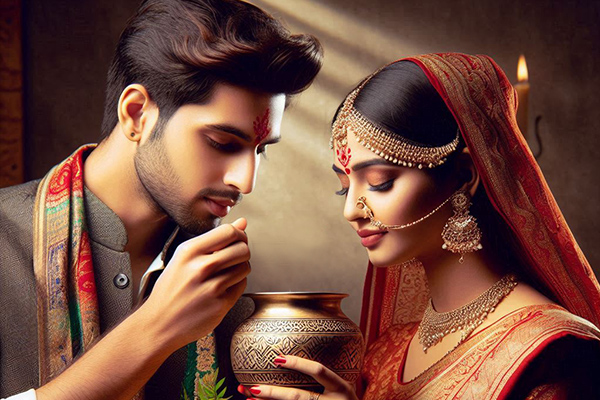
Dress up afresh.
Organize the Puja items required for worship of the Moon at night in order to break the Karva Chauth fast.
Once you see the Moon in the sky, light the diya (mud lamp) on the plate and ensure you have a direct view of the Moon.
Your husband should accompany you during this ritual.
Offer prayers to Chandra, the Moon God in whatever language you are comfortable.
First worship the Moon with the plate that has the diya and move it in a circular motion around the image of the Moon.
Sprinkle raw rice grains and turmeric powder in the direction of the Moon. Following this, offer the pot of water to the Moon. Just hold the pot in the direction of the Moon and pour some of the water into the ground before you. Leave some water in the pot as you will need it to break your fast.
Close your eyes and pray to Chandra for your wish.
Look at the Moon through the circular sieve and then at your husband. Your husband should now break your fast by first giving you some water from the pot. He should then take food items and offer you.
Now carry the plate inside, give it to your mother-in-law. Then touch her feet and she will bless you. Enjoy a delicious meal with your family.
Karwa Chauth Fast Rules
Women had to start the fast at sunrise, not eat or drink until moonrise.
Consumed from the mother-in-law, pre-dawn food (sargi) keeps one going all day.
It is expected of participants in the evening puja among other married ladies to pray for the lifetime of their husbands.
Only when the husband presents water and something sweet will the fast be broken—after seeing the moon.
Observing the fast requires complete dedication, mental purity, adherence to rituals and other qualities.
How To Open Karwa Chauth Fast
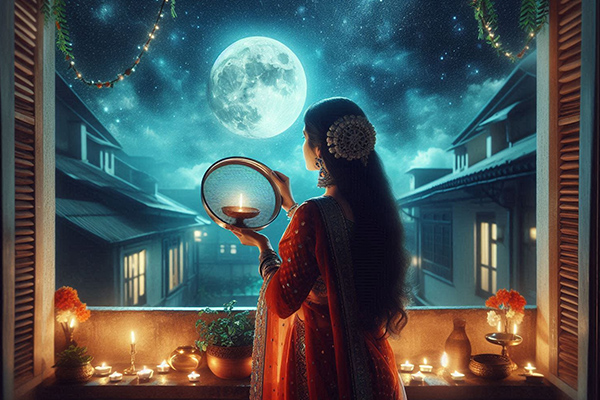
Women first see the moon and offer water (arghya) to it, praying for their husband's long life and prosperity, hence opening the Karwa Chauth fast. Usually, this is done while the moon and subsequently their husband are seen through a sieve. Following this custom, the husband presents his wife with water to break her fast, then something sweet—such as a fruit slice or a sweet dessert. After the day-long fast, this signals the conclusion of the fast and they then go to enjoy a light dinner together, usually comprising simple, readily digestible food to gently reintroduce nutrition.
What Can We Eat in Karwa Chauth Fast
Women traditionally refrain from eating or drinking anything from sunrise till they view the moon at night during the Karwa Chauth fast. They have a pre-dawn meal called sargi, which keeps them going throughout the day, though, before the fast starts. Usually including energy-boosting foods like fruits, nuts, chocolates, milk, and light, nourishing dishes like vermicelli are included in Sargi. These foods are light on the stomach and give required hydration and energy. Women typically start by drinking water after breaking the fast at moonrise, then eat simple, easily digested things like fruits, sweets, or light home-cooked meals to rehydrate and gently replenish their bodies after the day-long fast.
Karwa Chauth Rituals for Unmarried Girls & Women
While traditionally, this celebration was exclusively observed by married women, recently, unmarried girls and women have begun to observe this rigorous fast for their spouses. Many single ladies (and even single men) observe this fast to be rewarded with the perfect spouse or wife. For them, it is the purest expression of love and dedication. However, there are certain rites that distinguish the unmarried from the wedded.
For example, whereas married women and men must wait until the moon rises in the sky to break their fast, unmarried individuals may break their day-long fast by casting a short glance at the pole star.
Importance of Karwa Chauth
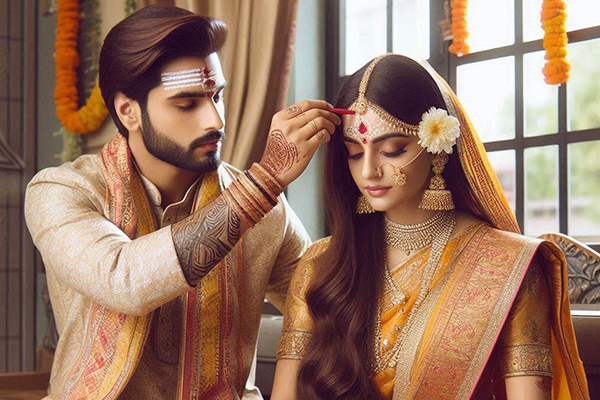
For Indian married women, Karwa Chauth is both emotionally and culturally very important. Seen with great dedication, this celebration marks the love and loyalty a wife and her spouse share. Women pray for their husbands' long life, prosperity, and well-being during fast from sunrise until moonrise. The day emphasizes commitment, sacrifice, and the purity of marriage, therefore strengthening the link between spouses. Beyond its romantic meaning, Karwa Chauth is a moment of solidarity and shared customs when women come to perform rites and share the Katha, therefore strengthening a feeling of community.
Karwa Chauth Associated Products & Services
Karwa Chauth Puja
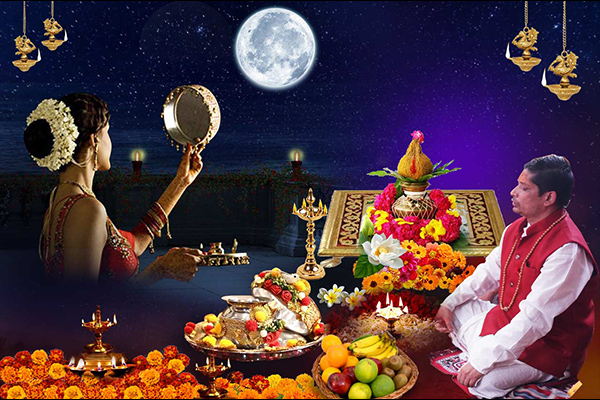
Observing Karwa Chauth fast and listening to Karwa Chauth Vrat Katha provides protection, brings happiness, prosperity and peace in the family.
Gauri Shankar Rudraksha
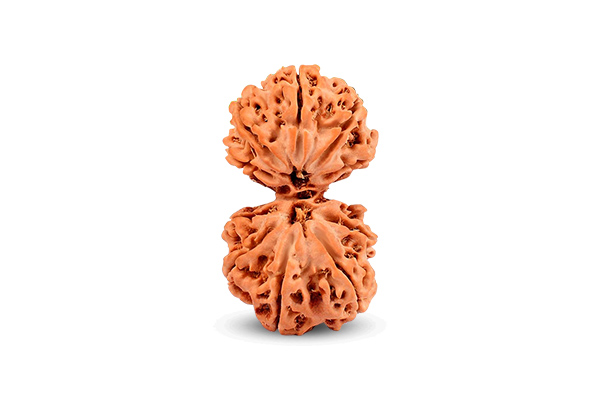
The Gauri Shankar Rudraksha is the unified form of Shiva and Shakti, represented by two Rudrakshas that are naturally joined. Karwa Chauth is the festival of celebrating the scared union of Shiva and Shakti. Buy this Rudraksha to receive the unified energy of Shiva and Shakti.
Lagna Yog Yantra
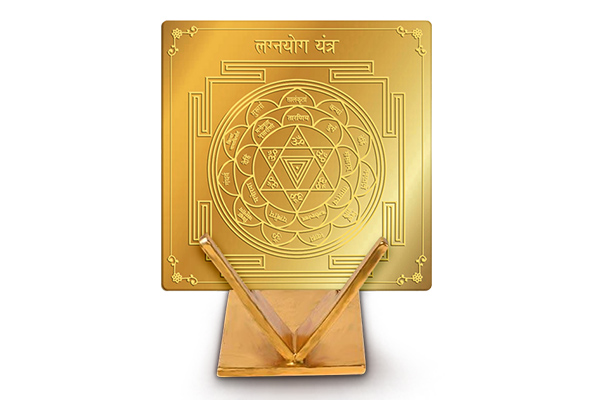
This yantra has divine power that removes any karmic obstacles that may stand in the way of your marriage. This Lagna Yog Yantra is appropriate for those who are experiencing delays and obstacles in getting married due to ancestral or karmic obstructions. Keeping the fast of Karwa Chauth and worshipping Lagna Yog Yantra is a very powerful way to seek the right partner.
Karwa Chauth Designer Pot “Karwa”
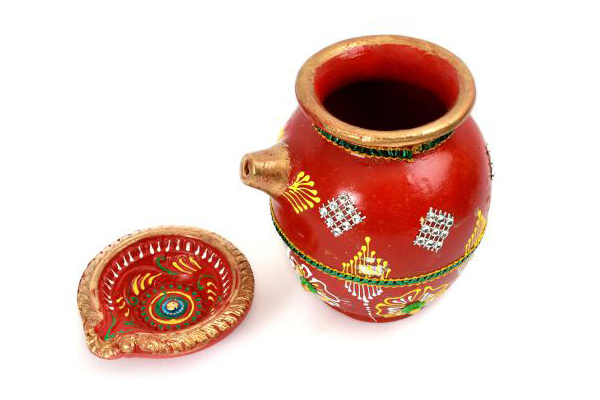
Earthern Karwa (Pot) used to hold water for offering to moon on the auspicious occasion of Karwa Chauth. The Earthen Karva Pot is handmade and is decorated with traditional designs and glasswork. Buy this Karwa to enhance your Puja.


-in-Astrology.jpg)
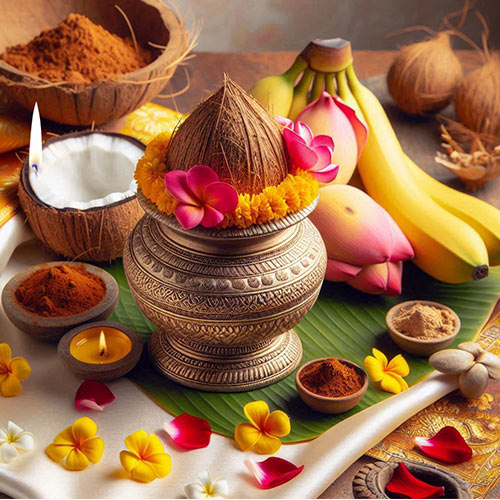
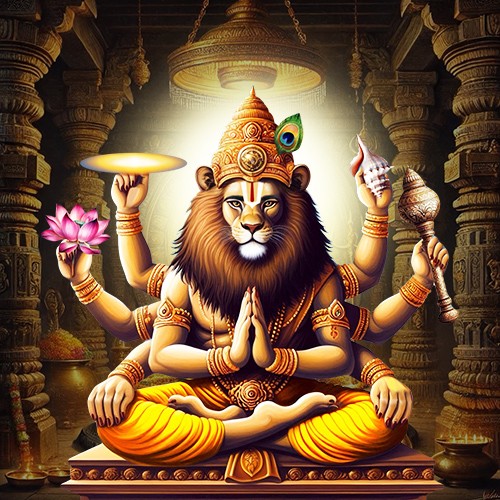
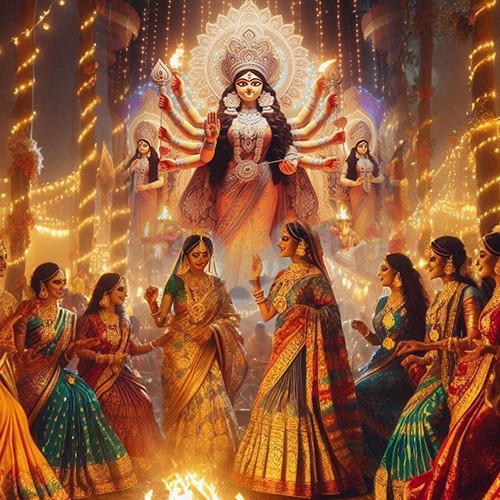
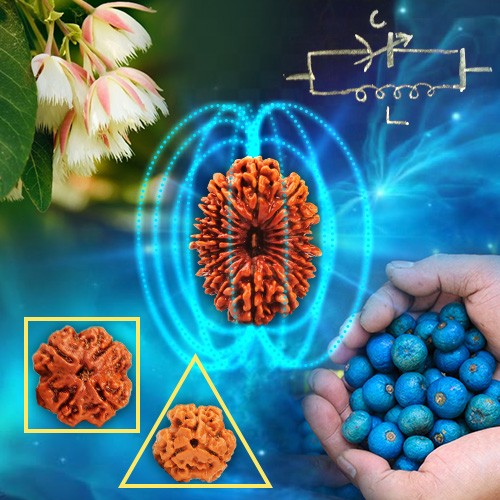

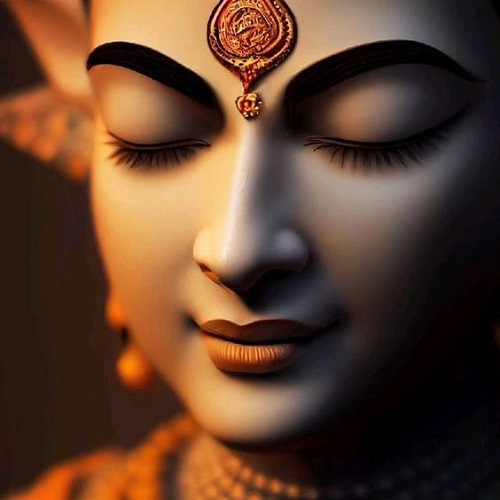
.jpg)
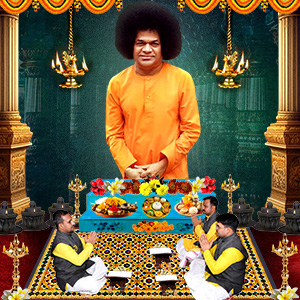
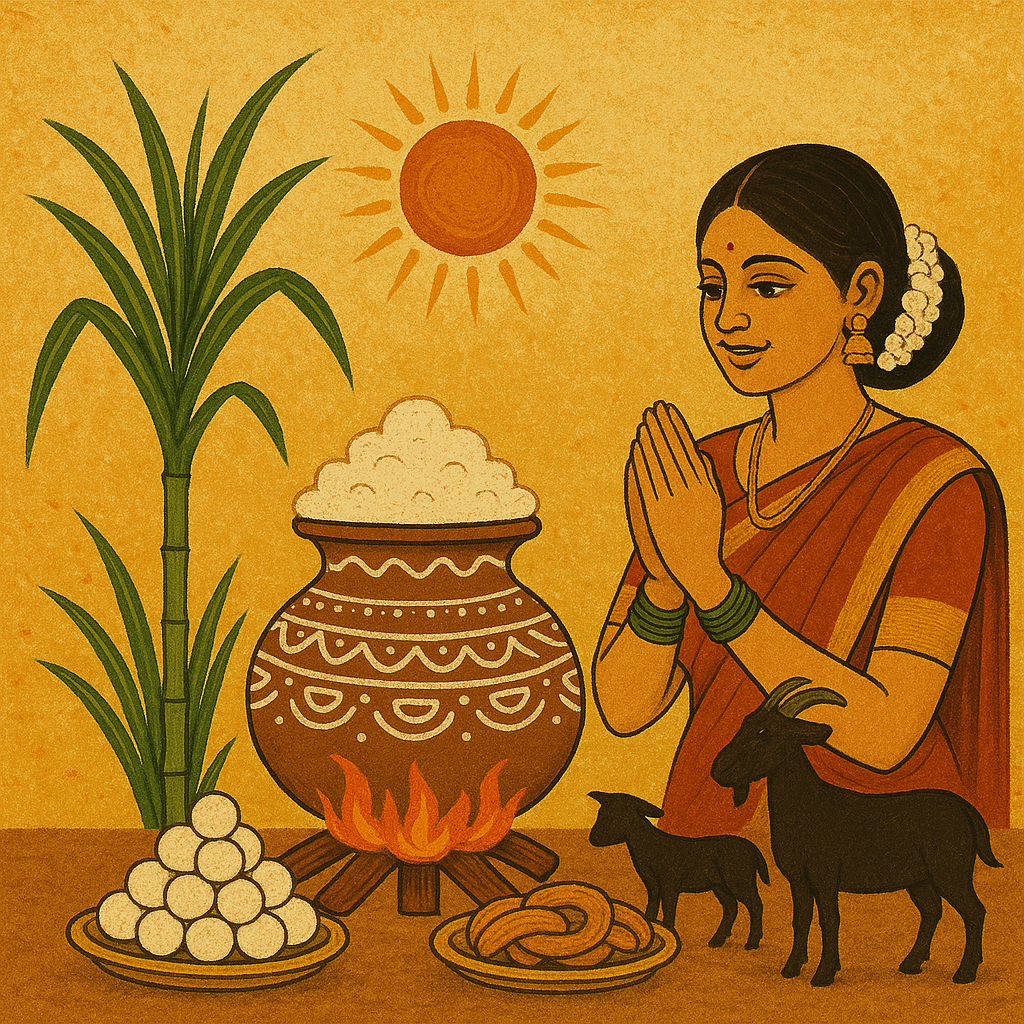
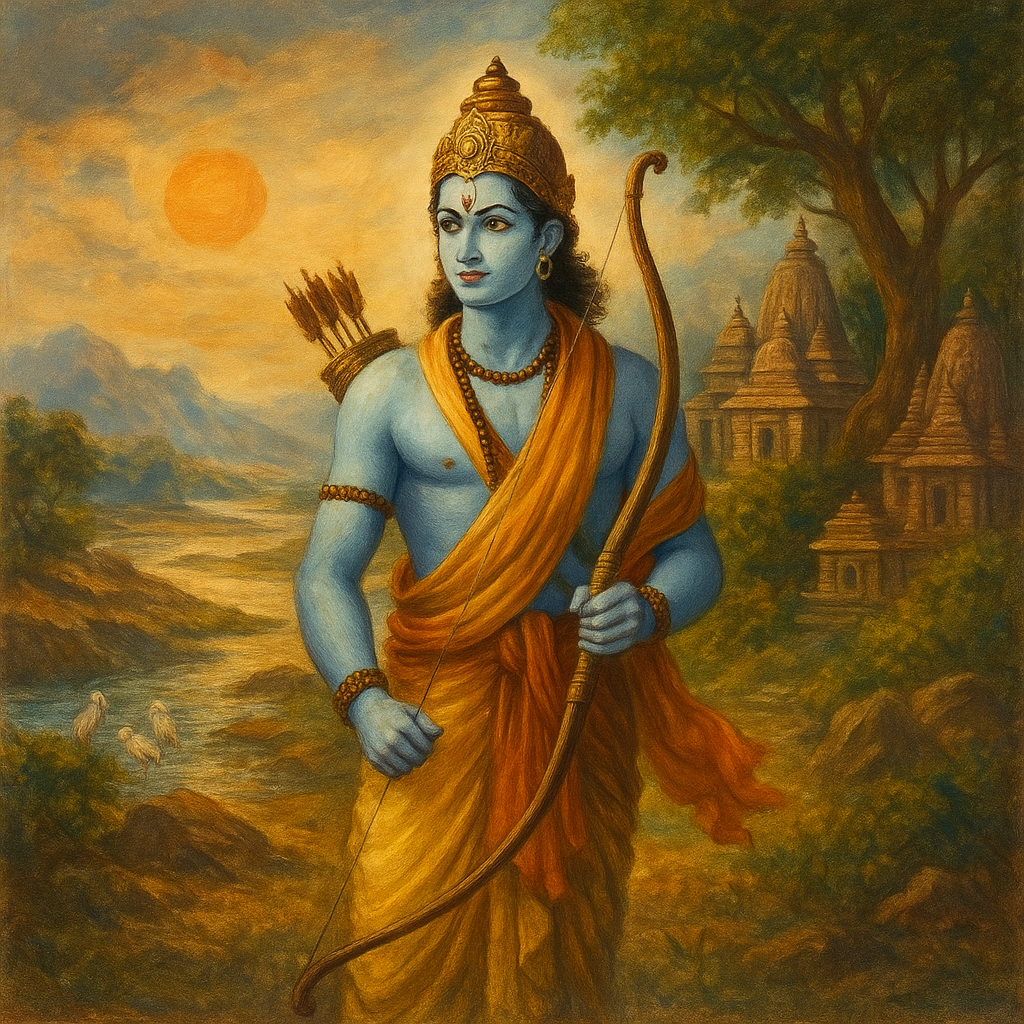
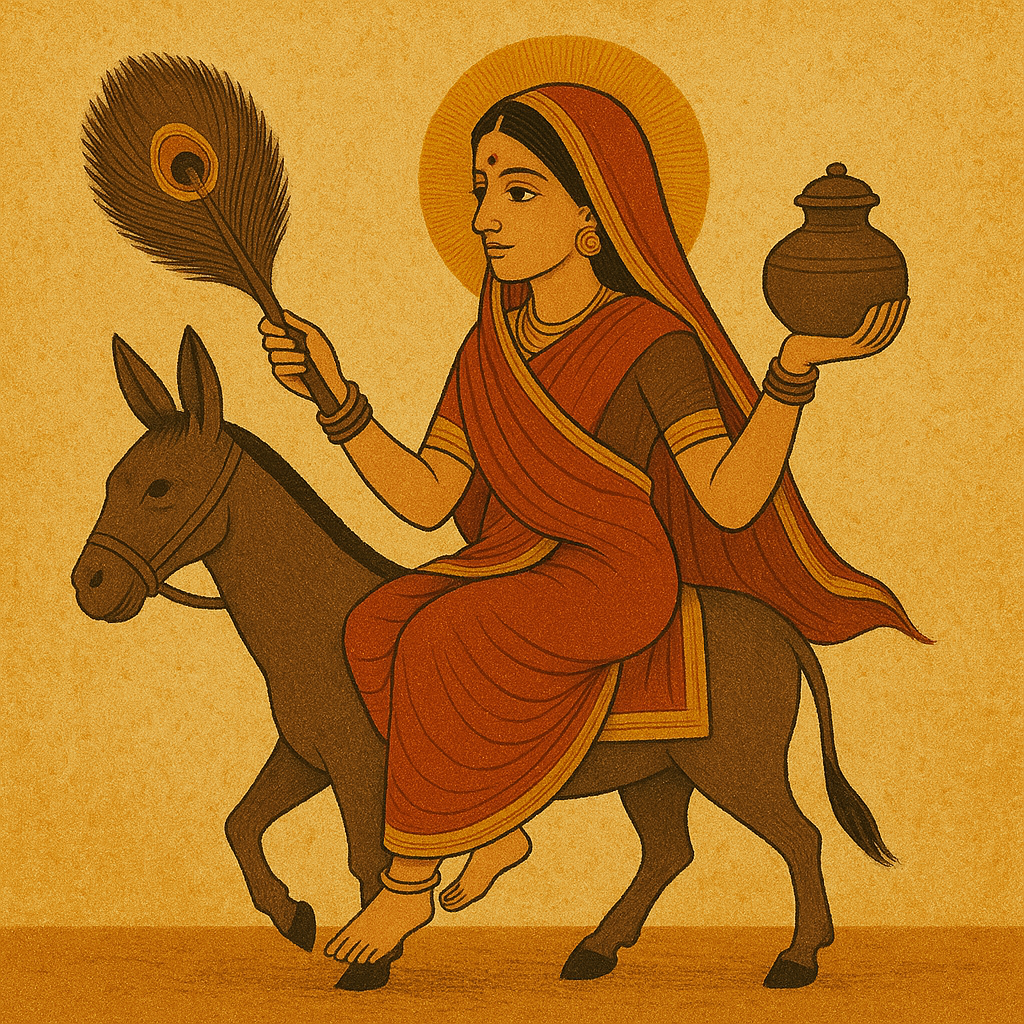
Comments 0
Leave your thought here